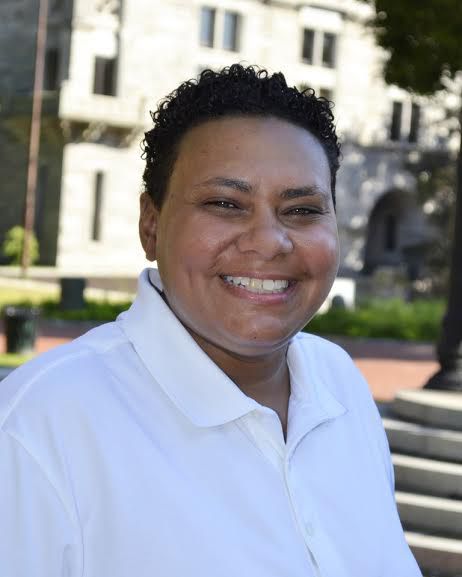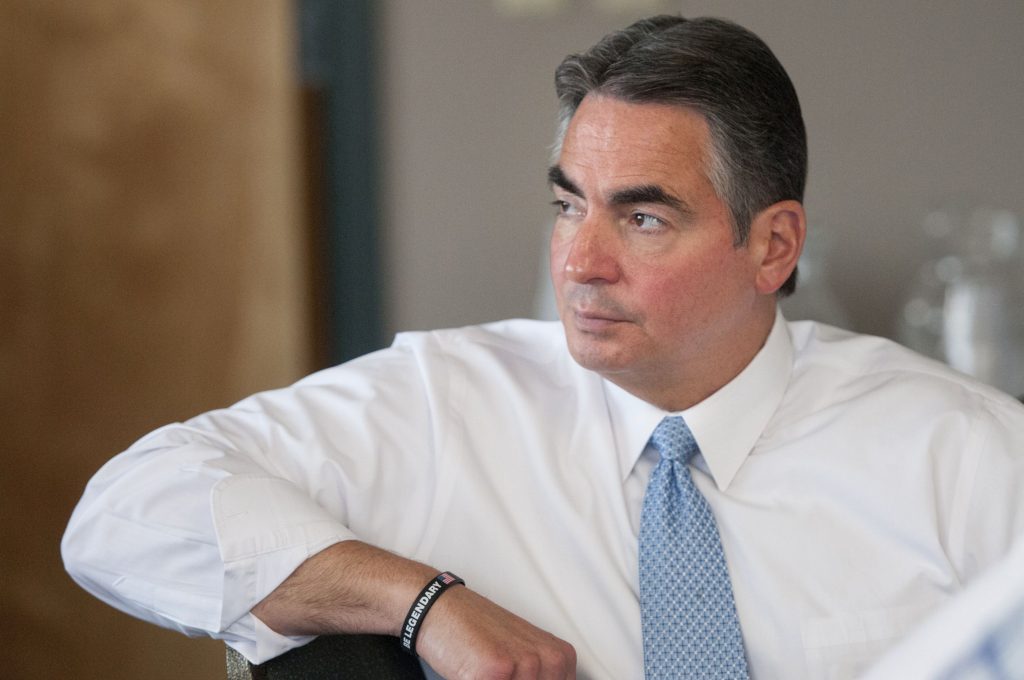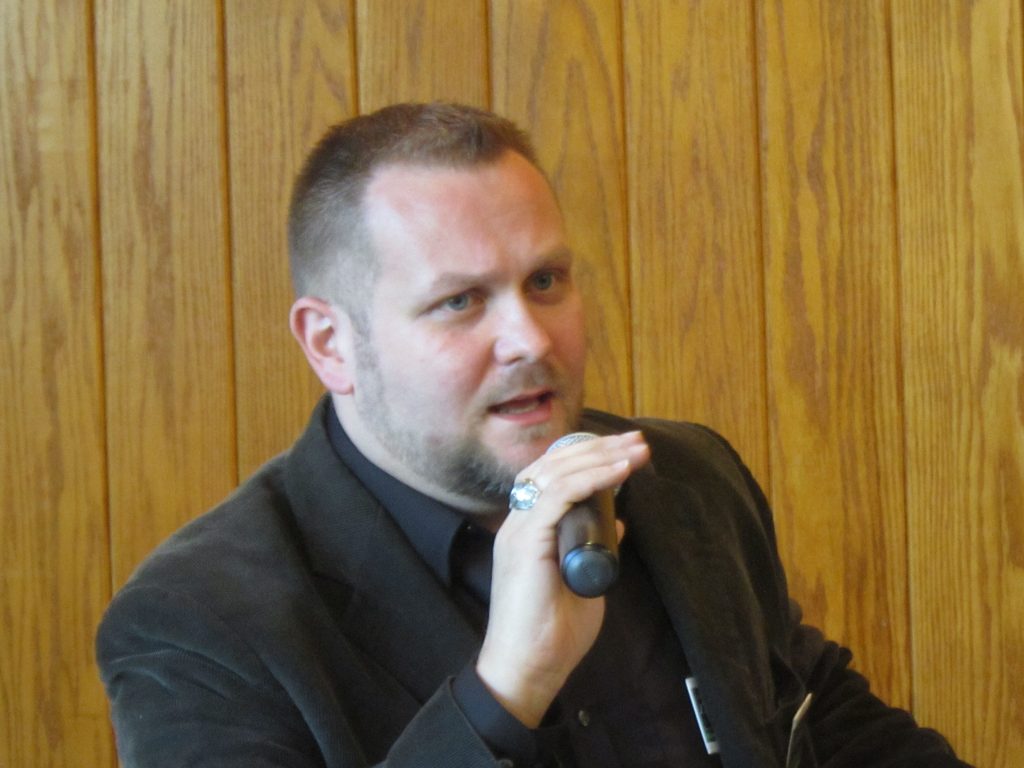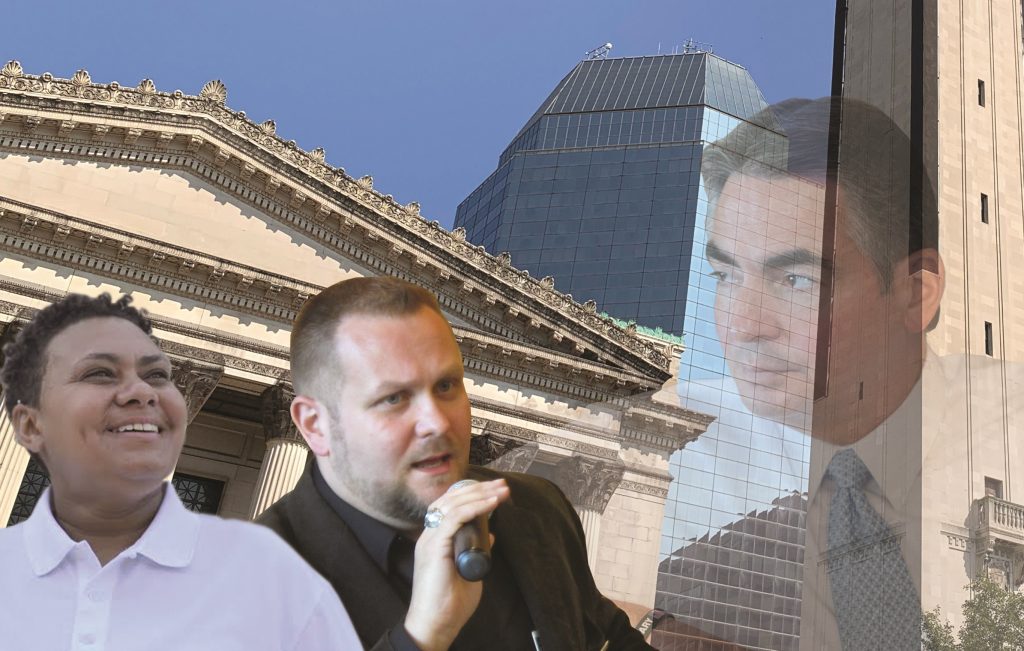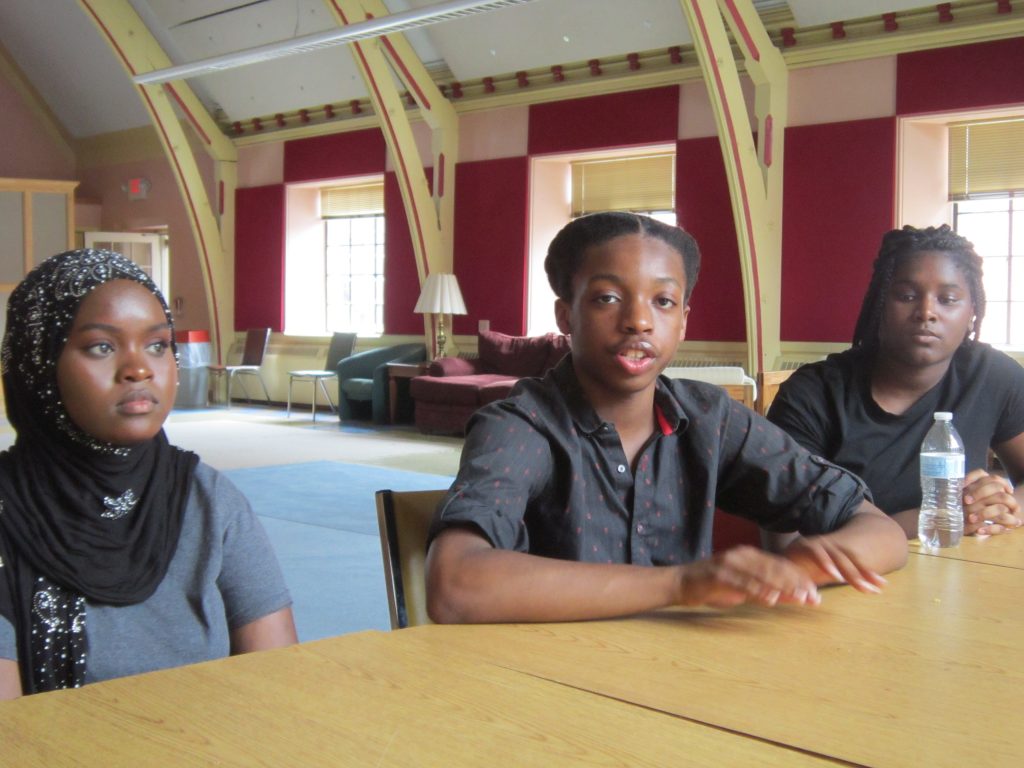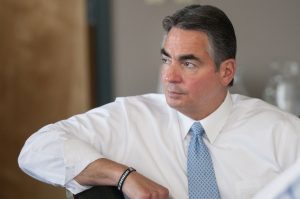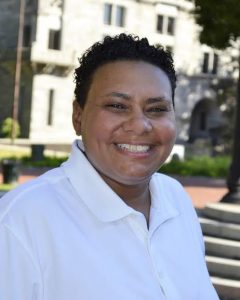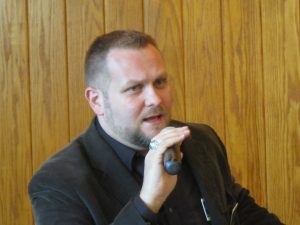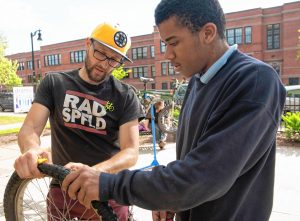Springfield Mayor Domenic Sarno has defined his 12-plus years as the city’s leader as “the people’s mayor,” but for 19-year-old Trevaughn Smith, that description of Sarno, which can be found on the city’s website, is a “loaded title.”
Smith, campaign director for former mayoral candidate Linda O’Connell, who suspended her campaign on July 28 due to an illness, thinks Sarno has failed to represent marginalized communities of color in the city.
“Unfortunately, he hasn’t really been meeting with the community as far as I know,” Smith said. “You are finding a lot of people of color who are generally disenchanted and disconnected with Springfield politics because it’s just basically the mayor in his office calling the shots and causing gridlock within the City Council and just basically being unable to use basic problem solving skills to even attempt to improve the lives of Springfield residents.”
And as Sarno is facing re-election this fall — with challengers Yolanda Cancel and Jeffery Donnelly still in the race — Smith is not the only one. Several Springfield-based activists agree that Sarno hasn’t been a present figure throughout the city.
Tanisha Arena, director of Arise for Social Justice, said she does believe Sarno is a present figure in the city, but not when it comes to low income communities.
“Is he present in all the communities? No. Are you present for folks who are homeless and addressing what their needs are? Are you present for our immigrant population? You’re not really for everyone in the city because if you were for everyone in the city, then the needs of poor and low income people would matter because they’re also your constituents,” she said.
Tara Parrish, director and lead organizer for the Pioneer Valley Project, said although Sarno has been re-elected several times, only a fraction of the city’s residents turn up to vote for him to serve as Springfield’s political leader.
“Will the incumbent mayor show up as a candidate to hear from constituents in the city, who are maybe not registered to vote?” she asked.
Springfield Neighbor to Neighbor organizer Zulmalee Rivera, said she also believes the city isn’t serving the best interests of low-income marginalized communities.
“Right now, it’s more appealing to attract people from outside to see how we can really rev up this economy, but is it really doing that?” she asked. “And that’s a big concern because if we can’t get our own people to invest in our own engine … how can we be more appealing to the outside world?”
Despite this, the mayor has overseen major accomplishments for the city such as the development of the $960 million MGM Springfield Casino and the creation of a $21 million Sodexo food service center this year, which allows students across the city to have daily access to fresh produce and foods.
But activists also pointed to issues such as affordable housing and rent control, as well as a lack of economic development for marginalized communities such as the North and South ends and Mason Square compared to the boom of investments the downtown area that have gone unaddressed during Sarno’s tenure as mayor.
As a longtime incumbent, Sarno has faced off against challengers over the years, but during a Sept. 10 preliminary election, he faces opposition from two candidates — former police officer turned Springfield activist, Cancel, 42, who decided to run for mayor to create change in the city after her son was shot at a Main Street convenience store in May and Donnelly, a 36-year-old self-funded candidate who works waiting tables for a living.
The Advocate spoke to both Cancel and Donnolly for this story, but after more than two weeks and multiple attempts to reach Sarno via phone, email, in-person requests, as well as written requests to his office and home address, he declined to comment for this story.
Following a Sept. 10 primary, the mayoral ballot will be whittled down to two candidates for the Nov. 5 election. Despite criticisms of Sarno, the challengers face steep odds given the incumbent’s history of high polling numbers in the city, name recognition, and more than $160,000 in political campaign funds.
Unwarranted criminalization
No one knows better than Cancel about Sarno’s penchant for divisive comments. Cancel works as a part-time acting manager at Club Aquarius, which Sarno has threatened to shut down over a May stabbing at the club.
“You don’t have to criminalize every situation and I think that’s [Sarno’s] downfall,” Cancel said. “Everything has to be criminalized. His first thought is ‘Lock them up. Let’s put ‘em away. Let’s throw away the key,’ without realizing that everyone who you lock up is going to come out without a job because we haven’t fixed a broken system in allowing somebody to face their court time. Then they come out and try to get into the work field and are denied with every excuse possible as to why you shouldn’t hire somebody.”
Cancel decided to run for mayor after her 24-year-old son, Thomas Hawkins Darden, was shot in the arm outside a Main Street convenience store. She initially thought of moving to another community after the shooting, but while visiting her son at the hospital, he told her that they should stay and she could continue her activism in the city.
“I’m thinking, he’s the one here with bullet holes in his body,” she said. “He should be the first one saying, ‘Yeah, ma, let’s go.’ The last thing I expected him to say was, ‘Ma, let’s stay and fight.’”
Cancel, who moved to Springfield in 2005, then decided the best way to change the city was to run for mayor.
She argued that she and Sarno have different visions and definitions of success for the city. She views Sarno’s vision as economic development for downtown Springfield, whereas she would like to see investments in marginalized communities.
“I care about what’s going on in our neighborhoods. I don’t give a crap about what’s going on downtown at this moment,” she explained.
Cancel is a former police sergeant for the Boston Police Department. She was with the department from age 21 to 23 starting in the late 1990s patrolling housing projects, but ended her career in law enforcement after being injured on the job. She then shifted her career path, moving to Hawaii, and worked for the state as juvenile detention worker.
Since moving to Springfield, she became involved with activism in the city with groups such as the South End Citizens’ Council and the Springfield Police and Community Relations Committee.
She ran unsuccessfully for a Springfield Ward 3 City Council seat in 2015 against Melvin Edwards.
Accepting no donations
Donnelly ran unsuccessfully for Springfield City Council in 2015 and 2017, but despite contemplating another run for city council, decided to run for mayor because is goal is to “do the most I can do for the people of the city.”
In his past bids to become a city councilor, Donnelly said he didn’t spend a cent on his campaign. This time, he’s saved up his own campaign funds, choosing not to accept donations, to let Springfield residents know that he doesn’t stand for money in politics.
Some of these issues Donnelly is campaigning for include removing a trash fee for residents by including the fee in property taxes, and a policy requiring police officers to wear body cameras, according to his website.
His day job is a server at a local restaurant, and Donnelly has a bachelor’s degree from Westfield State University in psychology and art education/ fine art. He also worked previously for the Department of Youth Services and is lifelong Pioneer Valley resident having grown up in Springfield and Ludlow.
With that background, he had hoped to create a community youth-oriented arts space at the former Indian Orchard fire station, but the city denied his bid to purchase the space.
“They denied me the fire station because they didn’t want to put me in debt,” he explained. “That’s actually what they put in writing. They asked me if I planned on taking out a mortgage.”
‘Accountability can piss some people off’
For many different activist groups in the city of Springfield, there’s a long list of issues that they believe the mayor should be more focused on.
Liz Wills-O’Gilvie, chair of the Steering Committee for the Springfield Food Policy Council, has been a longtime advocate for food justice in the city working to bring fresh and affordable healthy food to all Springfield residents.
She said one of the biggest improvements in the city was the creation of the $21 million Sodexo food service center earlier this year, which many told her would never become a reality.
However, she thinks the city still can do more in terms of fostering smaller economic developments such as farmers’ markets and grocery stores in areas of the city such as Mason Square, and the North and South ends, where access to fresh healthy and affordable food is scarce.
Wills-O’Gilvie credits Sarno’s administration and the city’s support for making the food service center a reality, but believes that smaller economic development projects need to be supported across the city, not just downtown.
Arena, executive director of Arise for Social Justice, gave a list of different issues that she’d like to see Sarno or a future new mayor address, including creating a citizen review board for the Springfield Police Department made up of neutral residents without an affiliation to the department, rent control and more affordable housing in the city, treatment on demand for those with addictions, and banning biomass facilities in the city.
And as the new executive director for Arise having started in the fall of 2018, she hopes to meet with Sarno to open a dialogue about the many issues facing the city. As a parent she got to know Sarno through his role in the School Committee before becoming head of Arise for Social Justice.
“Can we have a conversation? Because the relationship between the mayor and Arise has been adversarial … Basically, it’s about holding people accountable. Accountability can piss some people off if they’re not used to being held accountable. And I think that’s a part of it. With me, I at least want to start with a conversation. I’m not going to come out screaming at you because there’s history that I’m not a part of. Let me see where you’re at,” she added.
For people in the city who are homeless, she thinks Springfield could do more when it comes to providing cold weather relief throughout the winter months. Arise is advocating for emergency shelters to open at 40 degrees Fahrenheit, but right now they open at 20 degrees Fahrenheit.
She’d like to talk a walk with Sarno sometime in the fall or winter in the cold and talk about the issue.
“Could you imagine if you didn’t have any place to go? This is it. It’s about putting someone in that situation. This is reality for some residents of Springfield. With the policies that are being put into place, are you really thinking about the impact of what you’re doing?” she said.
But for Arena, she said she’s excited by the challengers facing Sarno during this election cycle, especially Cancel.
“When something happens to a person, that turns them into the biggest activist,” she added. “[Cancel’s] already been active in the community. When her son was shot, that just elevated what she was doing to an entirely different level. I respect that. You took this thing that could have been a major tragedy and know, ‘I’m going to do some good around the whole community’ in ways that she feels are missing and maybe a lot of us feel are missing?”
Rivera, an organizer with the Springfield chapter of Neighbor to Neighbor, said there’s an affordable housing crisis in Springfield, an issue that impacts communities throughout the city.
In the past, Sarno’s also refused to name Springfield a sanctuary city, which despite his objections was approved by the City Council in January in a 10 to 1 vote overriding his veto.
“I don’t think [Sarno] has been in favor of providing an economic avenue for the residents of Springfield,” Rivera said. “We have to fight for sanctuary city, so that everybody feels safe so they’re adding to the economy.”
She hopes a new mayor would promote change for marginalized communities in Springfield.
“Yolanda is very issue-based,” Rivera said. “I think if she does get the mayoral position, she can grow into learning how to work it as anyone that gets into a position.”
Sarno has also gotten under the skin of some city bicycle advocates. On April 17, Sarno wrote a statement posted on the city’s Facebook page: “Like the vast majority of law abiding citizens here in Springfield and around the country, I have no patience and/ or use for these miscreants’ actions, who create dangerous public safety issues by harassing drivers and pedestrians who are just going about their daily business.”
Alex Weck, 35, of Springfield, who runs bicycle meet-up events in the city focused on the city’s youth called “Ride All Day” Springfield, said he thought Sarno’s comments offered no plan to solve the issue and were only meant to incite.
He also took issue with Sarno’s language, which he described as racially charged. Many of the young bike riders in the city are people of color.
“To judge all riders as miscreants under one banner flatly like that. We’re trying to push back,” Weck said of the mayor’s comments. “We’re struggling not only with the basic infrastructure improvement, but barriers that further limit opportunities for youth bicycle riders in Springfield.”
Betsy Johnson, an organizer for Walk/Bike Springfield, thinks there’s been some progress in the past few months with the city in terms of moving the idea of a dedicated BMX bicycle/ skatepark forward, specifically with Timothy Sheehan, chief development officer for the Springfield Office of Planning and Economic Development.
Voter apathy or voter access?
This isn’t the first time that Sarno has faced off against political opponents. In 2009, his opponent was City Councilor Bud Williams and Sarno won received 69 percent of the vote to Williams’ 29 percent. In 2011, competing for a newly-established four-year term as mayor, Sarno defeated another councilor — Jose Tosado — with 71 percent of the vote. Four years ago, in 2015, Sarno won his fourth term in office against local business owner Salvatore Circosta with 77 percent of the vote.
Springfield Election Commissioner Gladys Oyola said voter turnout varies from year to year, but generally polling numbers in Springfield has been in decline for about a decade. Voter turnout is usually lower during municipal elections compared to state and national elections.
“I cannot say what the major contributing factors are,” she explained. “However, I believe that part of what contributes to the increase in voter turnout is the interest in the candidates or the issues on the ballot.”
In November 2015, when Sarno faced off against Circosta, just 16.5 percent of Springfield voters came out to the polls on Election Day. That same year, the city of Lowell saw low numbers as well with 18.2 percent of voters turning out. By comparison during the 2016 presidential election, 53.1 percent of Springfield residents went to the polls to cast their vote, according to data from the Springfield Election Commission.
But Cancel said she believes it’s more than just your typical voter apathy that accounts for lower voting turnout in Springfield. She said there are not enough locations in the city that are accessible to senior residents and those from communities such as the Mason Square neighborhood.
“It’s almost like you don’t want people to go out and vote,” she said. “One of our voting locations is right across the street from the Symphony Hall. Nobody lives over there. There’s no parking over there, except for a parking garage that you have to pay for. The closest bus is at Court Square across the street from MassMutual … That makes no voting sense.”
Donnelly said he thinks the location of polling stations isn’t as much of an issue due to polling stations being spread out throughout the city and generally located not far away from neighborhood hubs.
Oyola disagreed with Cancel, stating that locations and access to voting in Springfield has “no negative effect on turnout from my perspective.”
There are 64 polling locations located across the city, 11 of which are located in senior living facilities, Oyola said.
“Additionally, the Board of Elections works closely with group quarters (assisted living, nursing homes, etc.) to facilitate absentee voting for seniors that are unable or choose not to vote in person,” Oyola said over email. “The senior population is actually our most active group of voters in Springfield as is the trend nationally. We also do annual evaluations of our polling sites to ensure that they continue to meet ADA guidelines. Therefore, I disagree that polling sites and access thereto is an issue affecting turnout.”
She explained that the Election Commission is working internally with the city’s finance team to implement a Voter Notification Ordinance, which was recently passed by the City Council in June and would involve postcards being sent to all Springfield voters ahead of municipal elections to help spur higher voter turnout.
Donnelly said he thinks city residents often aren’t aware of candidates running for political office in the city in regards to their backgrounds and the issues they’re for or against.
“It’s not about voter turnout,” he explained. “When it comes to voter turnout it means very little if the people don’t know about the candidates.”
He thinks the city should send all city residents a candidate guide, with each candidate delivering a ‘Yes’ or “No’ response to questions related to issues in the city.
‘A heck of a hill to climb’
As of July 31, Sarno had raised more than $169,000 for his 2019 campaign, according to data from the Massachusetts Office of Campaign and Political Finance. By comparison, Cancel raised about $1,300 and Donnelly is self funded and isn’t accepting campaign contributions. O’Connell raised more than $5,000 before suspending her bid for mayor.
Political Consultant Anthony Cignoli, head of the A.L. Cignoli Company in Springfield thinks that newcomers challenging Sarno face an uphill battle against the incumbent, but not just because of Sarno’s campaign funding.
“The difficulty for these remaining opponents, they’ve got a heck of a hill to climb and just getting the word out as to who they are, why they’re running, how they would do the job differently,” Cignoli explained. “I would think that Mayor Sarno is in an extremely good position to win re-election.”
But Donnelly, isn’t too worried about Sarno’s political war chest.
“If this were a two way race between me and Sarno, I believe I’d win,” he said. “The guy’s a coward. I’ve walked into his office numerous times with issues and I’ve seen him walk out of his office, see me, turn around, and walk back in.”
Cignoli said there are many factors that contribute to Sarno’s past success with voters, including his “omnipresence” within the Springfield community, specifically in the aftermath of the 2011 tornado, as well as his name recognition, and he also believes that voters know where Sarno stands on issues, even if they don’t agree with some of his stances.
“The other thing is that the mayor’s name recognition and favorability numbers are extremely high,” he added. “We do a lot of polling through the city. Those polls are very in depth, they’re issue oriented. We get deep into what’s on people’s minds in a community… When we ask, even in free association, about the city, about the leadership in the city, immediately we get the response that, ‘The mayor’s doing a good job’ or ‘I like the mayor.’”
Cignoli said unlike many other mayors, Sarno has seen his fair share of challengers over the years, which gives his campaign an edge.
As for the controversial statements Sarno has made over the years, Cignoli said he doesn’t think that would impact voter favorability.
“He may say something, but in the same week, you’re going to see him somewhere in the neighborhood,” Cignoli added. “You’re going to see him at the senior center, you’re going to see him at Calhoun Park in the North End. Stopping the car, getting out, saying ‘Hi, how are ya?’ Grabbing a basketball. That’s him. It’s this omnipresence.”
He recalled an experience he had when he was arriving home past 11 p.m. at night and saw someone sitting in their car checking street lights to see if they were working properly. That was person as it turns out was Mayor Sarno.
Absent at a forum
Youth for Action Springfield, a teen-organized group promoting civic engagement and addressing issues in the city such as gun violence, invited all three mayoral candidates to a public forum on Aug. 1 at the Springfield City Library’s Mason Square branch.
But it was only Cancel and Donnelly who took part in the forum. Sarno told organizers he couldn’t make the event due to a previously planned family commitment, according to Smith, who took part in organizing the event.
Youth for Action also invited At-Large City Council candidates to the forum, with questions aimed at council and mayoral candidates. Residents also had the opportunity to field questions, with many asking about gun violence in the city.
Donnelly argued that judges can play a role in stopping violence in the city by increasing the bail on individuals arrested related to guns and drugs.

Springfield Central High School students, from left, Khadija Mohamed, Richard Parris-Scott, and Dahvé Coleman organizing a Springfield mayor candidates forum through their work with the Pioneer Valley Project. Chris Goudreau photo
“The judges are just releasing them on $50 and $100 bail, and then they’re going out there and committing it again with drugs and violent crimes,” he said during the forum. “There’s very little that the mayor, the city council, and the city council can do to stop it.”
Cancel countered that “there’s absolutely everything the mayor in the city could do,” which was met with applause by the audience. “As mayor, you can have a year-back buy back program. I’ve just met with an excellent group called Moms Against Gun Violence, just last week. They have the money in the budget and want to use Springfield as a pilot program to have a year back-buy program. The gun that shot my son was just found in the hands of a 16-year-old and it was stolen in Westfield in 2014. That’s how long that gun has been on the streets.”
Although the two candidates offered different answers to this issue, there were several topics that they agreed on, including adequate funding for Springfield Public Schools, which was found in a study this year by the Massachusetts Budget and Policy Center to be underfunded by $94 million.
“We always see that certain neighborhoods get more money,” Cancel explained. “I want to make sure that the neighborhoods that are mostly impacted are receiving these funds.”
They also agreed on implementing oversight changes to the Springfield Police Department, but differed on the methods.
“We need to basically get someone in there who’s going to get rid of the bad cops that we still have,” Donnelly said. “We also need a strong citizen review committee to actually police the police. For the most part, we can’t trust that they’ll police themselves. There’s a lot of good cops, but there’s also a lot of bad cops.”
As a former police officer, Cancel said she believes that years of training prior to becoming a cop are required. Currently, police officer candidates have 12 weeks of training.
“Look at that qualification,” she noted. “Would you want that from a doctor who is operating on you? We need to have police officers who have behavior health training, mental health training. They need to be better and more equipped. If we’re asking a 21-year-old with a high school diploma to become a police officer, after passing the civil service exam, then the academy has to at least be two years, not 12 weeks.”
Both newcomer candidates shared criticisms of Sarno’s administration during interviews with the Valley Advocate, one of which is Sarno’s history of support for a proposed biomass plant in the city, despite Springfield being named the asthma capital in the United States by the Asthma and Allergy Foundation of America for 2019.
For a group of Springfield Central High School students who are members of the Pioneer Valley Project’s Youth Voices United, there’s also a shared belief that Mayor Sarno hasn’t been a present leader in their communities going back to their childhood. That’s one of the reasons why they’re organizing a mayoral candidate forum at their high school slated for Sept. 5 from 6 to 8 p.m. at 1840 Roosevelt Avenue.
As of press time, organizers said Cancel and Donnelly had confirmed to attend forum, but they had yet to receive a response from Sarno regarding his participation in the event.
Khadija Mohamed, a 17-year-old Central High School student, said she’s only seen Sarno at parades and graduations, but hasn’t seen him at rallies against gun violence in the city across the street from the Springfield headquarters of gun manufacturer Smith & Wesson.
“For this next mayor, I would like someone who’s more involved with the community,” she explained. “We would like someone who could stand with us and back us up in what we believe in. We’re striving to make the community a better place. If we had our future mayor standing with us, it would be great.”
Richard Parris-Scott, 16, described Springfield as a cultural melting pot with different cultural communities across the city. He thinks mayoral candidates should be involved with all of the communities they represent.
“I want to make sure that all of our candidates would be involved in every single community from all walks of life, whether they are immigrants or homeless, whatever the case maybe. Everyone should have the same respect,” he said.
Chris Goudreau can be reached at cgoudreau@valleyadvocate.com.


